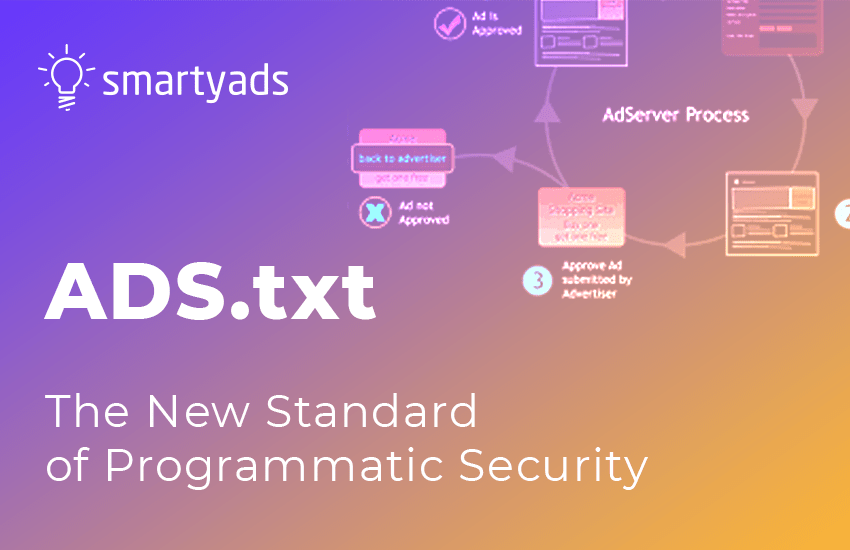Earlier this year, the Interactive Advertising Bureau (IAB) Tech Lab introduced the Authorized Digital Sellers or ads.txt initiative that aimed to eliminate fraud and increase transparency in the programmatic advertising ecosystem.
The ads.txt initiative addresses major issues of the digital advertising: domain spoofing, unauthorized inventory reselling and fraudulent digital ads. The main goal of ads.txt is to provide publishers with a greater control over approved dealers and give buyers more confidence in the inventory they purchase through the programmatic tech.
On June 27, ads.txt Version 1.0 has been finalized and officially released. Currently, the adoption of ads.txt is not mandatory, but there are rumors going around that the full-scale implementation will become imperative by Q4 of 2017. Let’s take a deeper look at ads.txt framework before it becomes a mainstream!
What is ads.txt?
Ads.txt is a plain text file created by publishers that discloses all their partners - legitimate sellers and resellers of their ad inventory. This list of these "authorized digital sellers" is then hosted on the root level of a publisher’s domain and can be easily accessed via HTTP/HTTPS from the website by the public.
How do publishers implement ads.txt?
Publishers can create an ads.txt file in Notepad or any other basic text-editing program according to the specifications set out by IAB. Ads.txt must contain the following fields:
- Domain name of the advertising system, SSP or an ad exchange (ex. ‘smartyads.com’);
- Publisher account ID (a unique string of numbers/letters);
- Type of relationship (‘direct’ or ‘reseller’);
- Type of inventory (#display, video, native, text)
This is how the string would look like in a “/ads.txt” file:
smartyads.com, pub-4111763448220873, direct #display, video, native
Examples of ads.txt files from premium publishers:
- http://www.nytimes.com/ads.txt
- http://www.businessinsider.com/ads.txt
- https://www.forbes.com/ads.txt
- https://www.washingtonpost.com/ads.txt
How does ads.txt work?
Publishers upload an ads.txt file to their web server that acts out as a public declaration of the companies that are accredited to sell their ad inventory. Then, media buyers and advertisers send web crawlers to scan thoroughly publisher’s sites and collect the lists of the authorized partners. After that, programmatic buyers create a filter that matches their ads.txt with the data provided by the OpenRTB bid request, checking the validity of every impression they purchase.
The ads.txt mechanism allows advertisers to separate authentic impressions from the fake ones and purchase inventory only from verified supply sources.
Why does the industry need ads.txt?
Ad fraud remains a top concern for the digital advertising industry. According to the Pixalate Quarterly Ad Fraud Benchmarks report for Q1 2017, 31% of all desktop, 36% of mobile app and 12% of tablet ad impressions were fraudulent. Businesses are losing billions of dollars to online advert fraud and the industry is waiting for real solutions.
Two of the most unreported but devastating forms of human-based traffic fraud is unauthorized reselling through arbitration and domain spoofing. In case of arbitrage, bad actors purchase questionable low-cost traffic and resell it at a higher price. With the domain spoofing, deceitful publishers use the name of the respectable media owner (ex. www.latimes.com/) to conceal the actual domain and sell impressions at premium prices.
Ads.txt is capable to solve an arbitrage and spoofed domains issues only if digital buyers and sellers work together and adopt the newest standard as soon as possible.
What is the benefit of ads.txt?
Digital media buying historically relied on the provided URL and the domain of a publisher, assuming they represent an authentic inventory. Days ago, ad tech companies incorporated blacklists of suspicious publisher domains and even shared this data across programmatic platforms. In this atmosphere of distrust and lack of knowledge, cybercriminals could easily thrive, commit ad fraud, and get away with it.
The newest ads.txt specification benefits both advertisers and publishers, bringing more transparency into the programmatic sales.
- Easy: The technical implementation is easy on the publisher’s side because the ads.txt file itself is lightweight and can be launched in any web browser. As for the advertiser’s side – IAB tech lab has recently released an ads.txt data crawler that can be found on GitHub.
- Secure: Ads.txt is 100% authentic because it can be posted only by a web administrator, therefore cannot be corrupted. Advertisers can always check whether they are buying from the legitimate inventory seller or not.
- Flexible: A publisher’s webmaster can easily edit and add new selling partners to the list when needed and upload the newest version of the ads.txt file anytime.
- Clear: The data required to fill in the ads.txt file is readily available in the OpenRTB protocol making it quick to gather. The ads.txt file can be added to a publisher’s ad server and further integrated with other programmatic platforms.
What are the challenges with ads.txt?
According to the Martech analysis, only 34 out of 500 most-trafficked websites in the U.S adopted an ads.txt framework. Certain media owners expressed concerns about giving away too much information about current partnerships with media sellers. Disclosing confidential data might be painful, especially for those publishers that are dealing with ill-reputable resellers.
Advertisers are not feeling pressed and do not hurry to buy inventory from authorized sellers only. Meanwhile, there still isn’t enough ads.txt inventory because publishers are waiting for the ad buyers to push the new solution forward. Some might argue that an ads.txt specification is putting a pressure on unlisted platforms and therefore disrupting the ecosystem even more.
Ads.txt adoption is still slow but is predicted to speed up with Google’s support and ad buyers’ enforcement. Experts believe that the industry standards will start changing when all the major DSPs take ads.txt into account.
SmartyAds support for ads.txt
We truly believe that the success of the ads.txt project largely depends on mass adoption. This new method may become a powerful tool in eliminating counterfeit ad inventory and halting unauthorized sales if we work collaboratively. Since its foundation, SmartyAds has been advocating corruption-free programmatic environment, with transparent relationships between adverts and publishers. We are encouraging our partners to take advantage of the new level of trust by incorporating ads.txt into their bidding!




